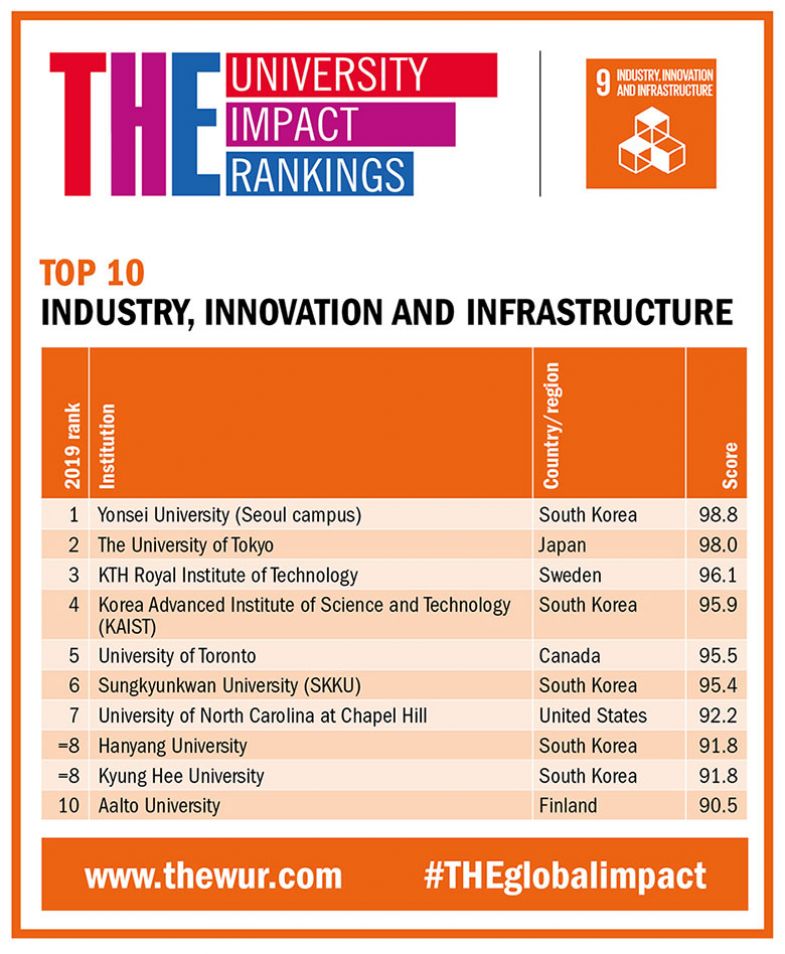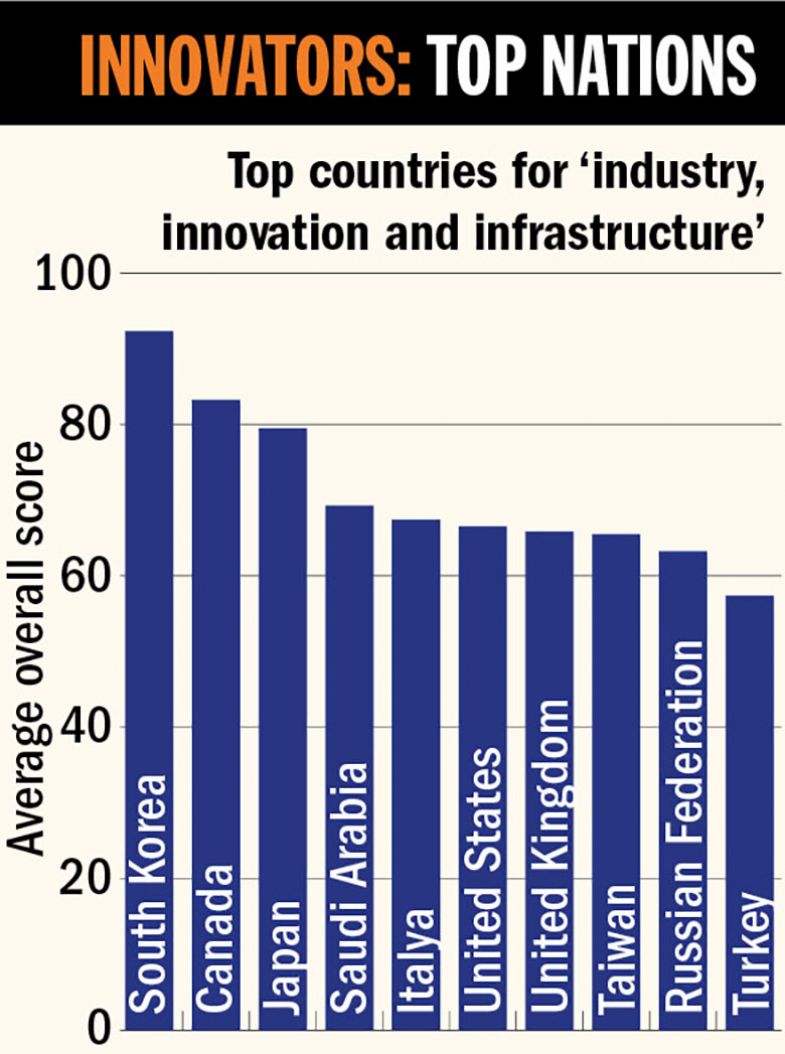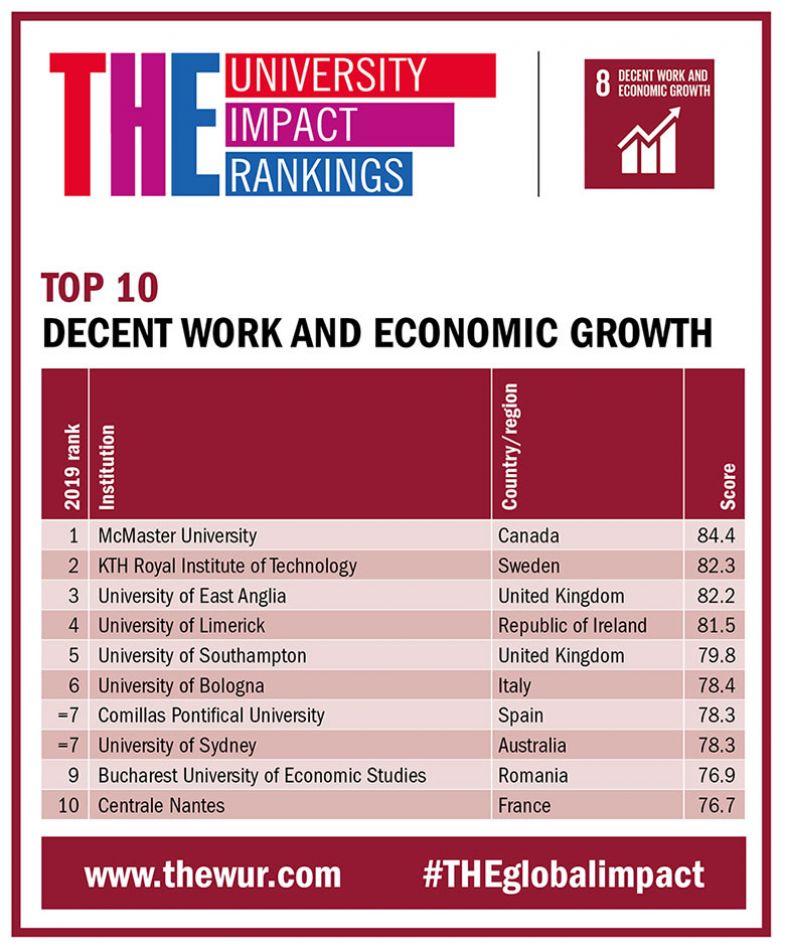Universities in major English-speaking, Commonwealth countries generally lead on measures of sustainability, according to the Times Higher Education University Impact Rankings, with nations such as Australia, Canada, New Zealand and the UK emerging as strong performers in areas such as tackling inequality, environmental sustainability and health and well-being.
But, when it comes to universities’ role of fostering innovation and serving the needs of industry, east Asian nations lead the pack.

Five South Korean universities feature in the top 10 of the THE University Impact Rankings table on industry, innovation and infrastructure, with Yonsei University’s Seoul campus claiming the number one spot.
Meanwhile, three Japanese universities and two Taiwanese institutions are in the top 20, including The University of Tokyo at second and National Cheng Kung University (NCKU) at 16th.
As a result, universities in South Korea received the highest average score in the table (92.4 out of 100), based on the top 100 and excluding nations with fewer than three universities ranked in the top 100. Canada is second in the country roll call (83.2) and Japan is third (79.5).

The table measures institutions’ research on industry and innovation, the number of patents that cite research conducted by the university, the number of university spin-offs and the amount of research income from industry per academic staff member. Yonsei University has 362 spin-offs, for example, while The University of Tokyo has 209.
Chang Kim, director of the Korean Association of Human Resource Development, said that South Korea’s strong performance was a result of “government policy emphasising industry-university-institute collaboration” as well as university strategies capitalising on the benefit of such cooperation.
“The Korean government has consistently emphasised industry-university-institute collaboration as a driving force for innovation growth in response to rapid social changes such as the Fourth Industrial Revolution,” he said, adding that the state provides funding to universities for such collaboration and recently established a “campus innovation park” plan to “develop idle sites in universities [into] high-tech industrial complexes”.
“If such high-tech industrial complexes come into existence on a university campus in the near future, it is expected that they will become ‘innovation infrastructure hubs’ that can provide quality industry jobs for students as well as more active industry-university-institute collaboration,” Dr Kim said.
Meanwhile, more than 80 per cent of universities in Korea have their own “industry-university-institute collaboration centres” and actively hire faculty members responsible for this area, Dr Kim added. “They organise in-house evaluation committees to continually monitor and improve industry-university-institute collaboration areas such as education, infrastructure, businesses, and community support.”
For instance, Hanyang University, which is joint eighth in the ranking, has introduced problem-based learning programmes and management consulting projects for students to help meet the needs of industry. More than 70 per cent of Korean universities, including Yonsei, have introduced start-up related courses to promote students’ entrepreneurship, he said.
Futao Huang, professor at the Research Institute for Higher Education at Hiroshima University, said that Japan has always “placed a great emphasis on developing engineering education and the collaboration between academia and industry”.
According to The University of Tokyo, the institution was the first in the world to establish a faculty of engineering within a university, in the late 19th century.
Professor Huang said that this model had a “profound influence on the later emergence of so-called imperial universities”, which were established by the Japanese government in the early 20th century. He said that the country’s national universities have a “much more direct and closer partnership” with private industry and business than the local public and private institutions, and tend to be stronger in the “hard sciences”.
Professor Huang added that the Japanese government has implemented several national-level strategies targeted at achieving the United Nations’ Sustainable Development Goals. The goals were used as a framework for the University Impact Rankings methodology.
Korea Advanced Institute of Science and Technology (KAIST), which ranks 4th in the table, has 65 university spin-offs, while its Startup KAIST initiative provides workspaces, training and practical programmes to help students launch their own businesses.
In January, LG Electronics also launched a new collaboration with KAIST to “take the lead in the 6G communications market”, said Shin Sung-chul, president of KAIST, adding that it was important for industry and universities to collaborate on the development of new technologies.
“Corporations often prefer short-term projects with greater commercial benefit. Meanwhile, universities usually pursue long-term research, but seek a bigger impact. Therefore, universities will play a better role in identifying and addressing social impacts [of technology] including ethical considerations that corporations might neglect,” he said.
Professor Shin added that in education the university has launched the idea of “the C3 Spirit” – encouraging students to be challenged, creative and caring.
“I would like to see the C3 Spirit infused into the strategies for university innovation and impact in the age of the fourth industrial revolution,” he said.
The universities scoring highest for employment practices
Universities in Canada and Europe are leading the way when it comes to their role as engines for economic growth and their responsibilities as employers, according to the latest Times Higher Education data.
McMaster University in Canada tops the THE University Impact Ranking for decent work and economic growth, while the rest of the top five is made up of institutions in Europe, including KTH Royal Institute of Technology in Sweden (second), the University of East Anglia in the UK (third), the University of Limerick in Ireland (fourth) and the University of Southampton in the UK (fifth).
The ranking measures universities’ economic research, their employment practices, their share of employees on secure contracts, and their share of students taking work placements.
|
Decent work and economic growth rank |
Position in World University Rankings 2019 |
Institution |
Country |
Decent work and economic growth score |
|
1 |
77 |
Canada |
84.4 |
|
|
2 |
187= |
Sweden |
82.3 |
|
|
3 |
190= |
United Kingdom |
82.2 |
|
|
4 |
501-600 |
Republic of Ireland |
81.5 |
|
|
5 |
118 |
United Kingdom |
79.8 |
|
|
6 |
180 |
Italy |
78.4 |
|
|
=7 |
NR |
Spain |
78.3 |
|
|
=7 |
59= |
University of Sydney |
Australia |
78.3 |
|
9 |
1001+ |
Romania |
76.9 |
|
|
10 |
401-500 |
France |
76.7 |

When it comes to country performance, Canada received the highest average score in the table (73.6 out of 100), coming ahead of New Zealand (70.7) and Ireland (70.5). The analysis was based on the top 100 and excluded nations with fewer than three universities ranked in the top 100.
At McMaster, 89 per cent of employees are on contracts of more than 24 months, while more than half (52 per cent) of students undertake work placements for more than a month during their studies.
Meanwhile, the University of East Anglia joined the Living Wage scheme in April, meaning that it now pays all its employees the voluntary living wage rate of £9 an hour, while 83 per cent of its employees are on contracts of more than 24 months.
A spokesman at the institution said that the university worked closely with student and trade union representatives “to ensure that we are providing a supportive and inclusive working environment and they have representation on UEA’s People and Culture Working Group, which provides processes for promotion and salary, flexible working and establishing and promoting a range of Athena SWAN initiatives”.
He added that UEA was “extremely proud of the quality and impact of our social sciences research”, noting that the university is ranked first for citation impact in the THE World University Rankings 2019 subject table on social sciences.
A spokesman at Spain’s Comillas Pontifical University, a private, Catholic institution, which is ranked joint seventh in the list, said that the institution’s commitment to the “professional and human development of its employees” was reflected through the “numerous policies that eliminate any discrimination based on race, sex and religion”.
“These plans to develop employees professionally encourage the pursuit of excellence [and] justice and the creation of a climate of trust between the university and its employees,” he said.
Register to continue
Why register?
- Registration is free and only takes a moment
- Once registered, you can read 3 articles a month
- Sign up for our newsletter
Subscribe
Or subscribe for unlimited access to:
- Unlimited access to news, views, insights & reviews
- Digital editions
- Digital access to THE’s university and college rankings analysis
Already registered or a current subscriber? Login









